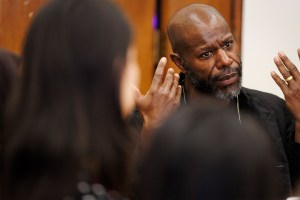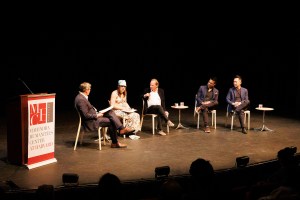The ‘art’ of retirement
100-year-old founder of HILR Shakespeare Players is feted by friends and fans
“May I have your attention!” yells Bill Boone, director of the Frances Addelson Shakespeare Players at the Harvard Institute of Learning in Retirement (HILR). “Frances is in Harvard Square!”
It’s Frances Addelson’s 100th birthday, and her friends are throwing her a surprise party. But this centenarian, a 1930 graduate of Radcliffe, isn’t in for the usual reception. This party involves Shakespeare, the second guest of honor, the playwright to whom Addelson has devoted countless hours of memorizing, directing, and performing as the founder of HILR’s Shakespeare Players.
Inside the Grossman Common Room, the players silently await Addelson’s arrival. They pore over their lines drawn from “The Tempest,” “Macbeth,” and “Hamlet,” among others, and adjust their period costumes — billowing peasants’ blouses and embroidered jackets.
“It’s like the president,” whispers Jane McGrath of all the fanfare. McGrath, a member of HILR for 12 years, has enjoyed Addelson’s productions over the years, but has never acted herself. “You have to have a voice that carries,” she says.
When finally Addelson is ushered in, the crowd stands and applauds. Addelson covers her mouth with her hands and bows in disbelief.
She is a petite woman and a snappy dresser. She carries a cane, wears a black jacket, long strands of pearls. Her hair is perfectly coiffed in a short, no-nonsense ’do. As she moves to her seat in the front row, she’s kissed and hugged by audience members and players alike. “I can’t believe it,” she says.
Addelson joined HILR in 1985; in 2001 she founded the HILR Shakespeare Players and became its director at the age of 92; and by 2005, the group was renamed in her honor.
Boone took over as director in 2006 when Addelson’s macular degeneration hindered her duties as director. Now Addelson serves as producer, and, according to Boone, “She really produces. We work as colleagues who are on the same wavelength. She is astute, and she has a big vision for our work. She is a great manager, and won’t take no for an answer. As soon as you do the task she asks you to do, there’s another one.”
But, for once, the tasks are out of Addelson’s hands, and strictly for her enjoyment.
“She is indeed inhabited by the soul of the Bard of Avon,” says Paul Pemsler, member of HILR and the party’s “master of the revels.” “We can honor Frances best by performing for her, and she can thank us best by performing for us.”
And with that, Jim McArdle, a white-bearded man in a lilac robe, takes the stage. “If music be the food of love, play on!” he announces.
And this is how the party goes: One by one the players recite soliloquies or pair up to perform scenes — there’s Rosalind and Orlando in “As You Like It,” Lady Anne and Richard in “Richard III,” and Lady Macbeth and the Doctor — or Nancy Wolcott and Marty Aronson — in “Macbeth.”
Wolcott wears a crimson velvet robe and carries a candlestick; she is to perform Lady Macbeth’s famous sleepwalking scene. The crowd is utterly quiet as Wolcott speaks, her eyes squinted, her face contorted. “Out, damned spot! Out, I say!”
“She is a trained actress,” whispers McGrath.
Addelson watches, motionless; she is hooked.
“To bed, to bed! There’s knocking at the gate:/ come, come, come, come, give me your hand. What’s/ done cannot be undone. — To bed, to bed, to bed!” exclaims Wolcott in her final lines. Addelson leaps from her chair to kiss her.
Addelson studied psychology and sociology at Radcliffe. From there she earned a degree in social work from Simmons College, and was employed as a social worker at the Reformatory for Women in Framingham, Mass. Long before Roe v. Wade, Addelson advocated for abortion rights for women with mental health issues while working at Beth Israel Hospital.
When she talks of her age, one can sense both the reward and curse of a century’s experience. It is, perhaps, Addelson’s work at HILR that keeps her going.
“I really don’t recommend it,” says Addelson of living to be 100. “There are so many pitfalls, so many losses of loves ones, of my contemporaries. … And so many aches and pains that you have to respond to because the body is claiming, ‘Enough already!’
“But there are some nice things, and those I want to tell you about. First, you get a certain glamour that you never knew you had. When you go to any medical facility, they want to know what the secret is.”
When Addelson performs, she is a compact thunderstorm, a force. She recites King Lear with such gusto that her body lurches with the words, her voice vibrates; one forgets she is not the doomed King of England.
“Let it be so; thy truth, then, be thy dower:/ for, by the sacred radiance of the sun,/ the mysteries of Hecate, and the night;/ by all the operation of the orbs/ from whom we do exist, and cease to be;/ here I disclaim all my paternal care,/ propinquity and property of blood,/ and as a stranger to my heart and me/ hold thee, from this, for ever.”
The crowd calls bravos as Addelson shoos away the applause. This isn’t just a group of Shakespeare-reading senior citizens, this is a community. The affection and admiration for Addelson and her work are evident in each face. Mostly there are smiles, and some tears. When Addelson recites King Lear — playing both him and the part of Cordelia — the crowd seemingly does not breathe. When she’s done, there is an audible collective sigh.
“I expected something, but never this,” says Addelson.
“Pretty soon there will be a surge of centenarians,” she says knowingly. “Members of the HILR and Shakespeare players will be the leaders in the art of retirement.”




